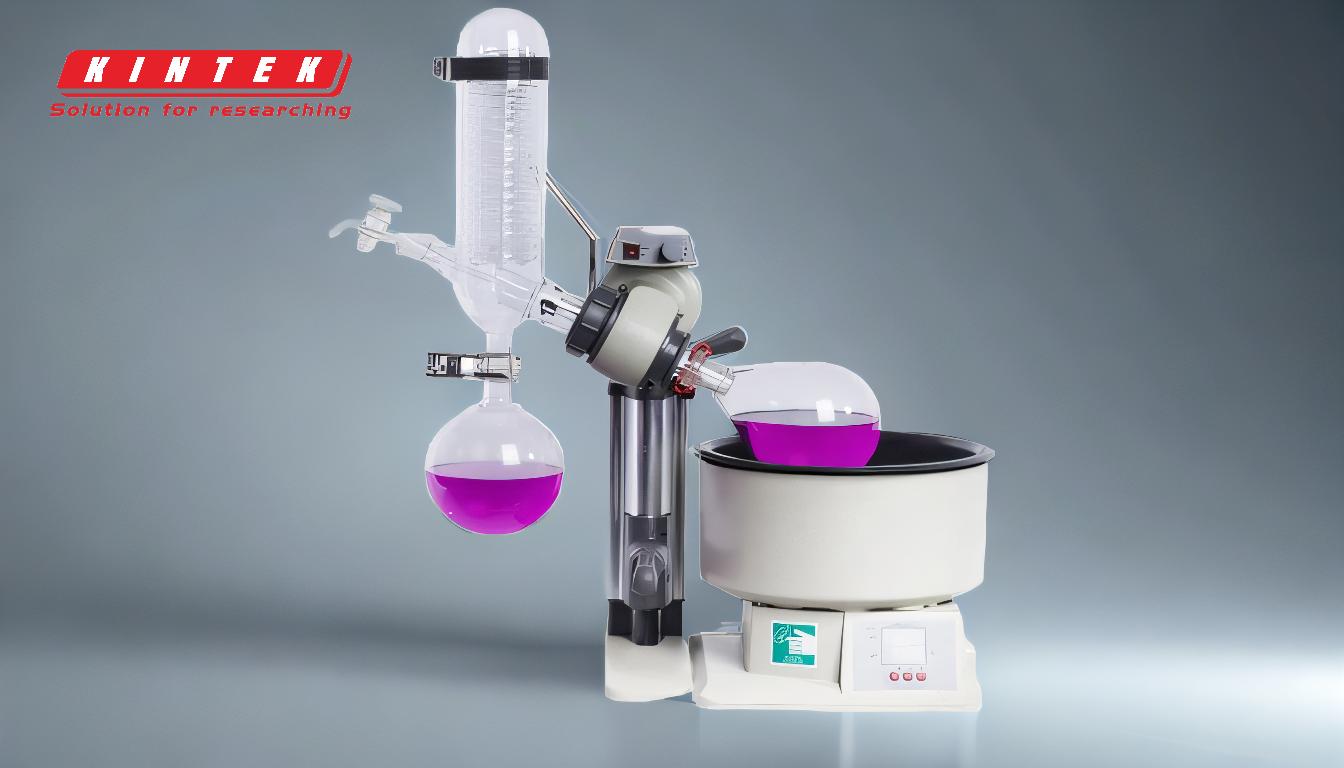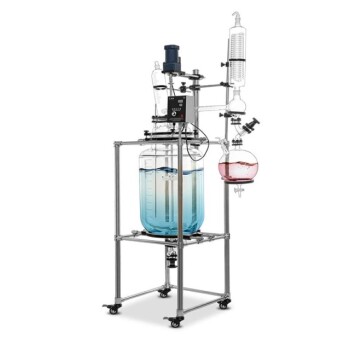Rotary evaporators, commonly referred to as rotovaps, are essential laboratory instruments used for efficient and gentle separation of solvents from samples. They are widely utilized in chemical, pharmaceutical, biotechnology, and research laboratories due to their ability to handle sensitive materials and volatile solvents under reduced pressure. The primary advantages of rotary evaporators include their high evaporation efficiency, ability to prevent bumping, and suitability for a wide range of applications such as concentration, crystallization, drying, and solvent recovery. Their design features, such as a rotating flask that creates a thin liquid film, precise temperature control, and high-efficiency condensers, make them indispensable tools for processes requiring rapid and controlled solvent removal.
Key Points Explained:

-
High Evaporation Efficiency:
- Rotary evaporators maximize evaporation efficiency by rotating the flask under reduced pressure, creating a thin liquid film on the inner surface of the flask. This increases the surface area for evaporation, allowing for faster and more efficient solvent removal.
- The large-area film formation ensures that the solvent is evenly distributed, reducing the time required for distillation and improving overall productivity.
-
Prevention of Bumping:
- The formation of a thin liquid film on the flask wall helps prevent bumping, which is the sudden, violent boiling of a liquid that can lead to sample loss or contamination.
- By minimizing bumping, rotary evaporators ensure a more controlled and gentle evaporation process, which is particularly important when working with sensitive or valuable samples.
-
Versatility in Applications:
- Rotary evaporators are suitable for a wide range of applications, including concentration, crystallization, drying, separation, and solvent recovery.
- They are particularly useful in the pharmaceutical and bio-pharmaceutical fields for the concentration and purification of temperature-sensitive biological products.
-
Reduced Distillation Time:
- The use of a rotary evaporator significantly reduces the distillation time for volatile solvents. For example, the time required to eliminate ether can be reduced from several hours to approximately 20 minutes.
- This time-saving feature is crucial in laboratory settings where efficiency and productivity are paramount.
-
Precise Temperature Control:
- Rotary evaporators offer precise temperature control, which is essential for maintaining the integrity of temperature-sensitive samples.
- The ability to control the temperature accurately ensures that the evaporation process is carried out under optimal conditions, minimizing the risk of sample degradation.
-
Compact and User-Friendly Design:
- Modern rotary evaporators feature a compact structure, ease of observation, and user-friendly designs that enhance their usability in laboratory settings.
- Improvements in appearance and humanization design, along with leakproofness comparable to foreign equipment, make them reliable and efficient tools for both laboratory and production environments.
-
Environmental and Economic Benefits:
- The high-efficiency glass condenser in rotary evaporators allows for the recycling of solvents, reducing waste and lowering operational costs.
- This feature is not only environmentally friendly but also economically beneficial, as it reduces the need for frequent solvent replacement.
-
Suitability for Sensitive Materials:
- Rotary evaporators are particularly suitable for handling materials that are sensitive to high temperatures. The gentle evaporation process ensures that the integrity of these materials is preserved.
- This makes rotary evaporators ideal for applications in the pharmaceutical and biotechnology industries, where the preservation of sample integrity is critical.
In summary, rotary evaporators are indispensable tools in modern laboratories due to their high efficiency, versatility, and ability to handle sensitive materials. Their design features, such as the rotating flask, precise temperature control, and high-efficiency condenser, make them ideal for a wide range of applications, from solvent recovery to the concentration of biological products. The benefits of reduced distillation time, prevention of bumping, and environmental and economic advantages further underscore their importance in chemical, pharmaceutical, and biotechnology industries.
Summary Table:
| Advantage | Description |
|---|---|
| High Evaporation Efficiency | Maximizes solvent removal by creating a thin liquid film for faster evaporation. |
| Prevention of Bumping | Ensures gentle evaporation, reducing sample loss and contamination risks. |
| Versatility | Suitable for concentration, crystallization, drying, and solvent recovery. |
| Reduced Distillation Time | Cuts down solvent removal time, improving lab productivity. |
| Precise Temperature Control | Maintains sample integrity with accurate temperature regulation. |
| Compact Design | User-friendly and space-efficient for modern lab setups. |
| Environmental Benefits | Recycles solvents, reducing waste and operational costs. |
| Sensitive Material Handling | Ideal for temperature-sensitive samples in pharmaceuticals and biotechnology. |
Enhance your lab's efficiency with rotary evaporators—contact us today to learn more!













